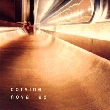|
|

Corvine Corvine was founded in Bergen three years ago, signed with EMI after only two years of existence, and has now released their debut EP. A couple of the songs on it have received a lot of radio airplay months before this release (available only as a promo), and this has brought them some well-deserved attention in Norway. Much of this focus has been centered around singer Marius Lynghjem's brilliant voice, which plays an important part in Corvine's music. He seems to be on top of it, even when going higher than what is normally thought of as high enough for today's male pop singers. On Nova his voice hovers above a mostly naked scenery created by the rest of the band: Marius Heggstad (guitar), Sixten Rahlff (bass) and Epsen Rahlff (drums). Together they create a slowly flowing river of sound. Very controlled, but occasionally bursting with energy. Nova's subdued opening lasts almost two minutes before a refrain comes along. Played sufficiently loud, it creates a sweet, vibrant, melancholy panorama, goose bumps guaranteed. The song ends with a churning "now ... is forever" primal scream, conveying some sort of existential discomfort. Well, the lyrics are not printed, so I can only guess. The daring lyrics like "Sha-ka-ko-ko-ko-ko-ko-ko-ko-kooooo" may be one reason for this - hearing it alone may be enough for some of us. Ko-ko's apart, Nova may be compared to the soundscapes produced by Mogwai, but more lightweight and pre-constructed (song/refrain oriented). Nova sounds like Mogwai teaming up with Jeff Buckley to do an innovative version of Bonnie Tyler's Total Eclipse of the Heart. The Mogwai/Buckley comparison holds true, although they totally lack Mogwai's aggressiveness, and Buckley's story telling capabilities are replaced with more diffuse lyrics. At least they share one thing with Mogwai - three of the songs on Nova clock in at well over 6 minutes.Matrix gives us more of the same sophisticated melancholy. The refrain is more constrained, but also more original. The balalaika-like guitar makes me think of a similar thing done by Crime and the City Solution on You Put The Sun Before The Darkness, but again, it has to be said that Corvine are much more polished, and ultimately comes through as a somewhat shallower band. This makes me wonder: What is beneath the glossy surface of Corvine? This question is even more justified after hearing the two last tracks. Moribond tries to be more experimental, including repeated "lo-fi" samples of the French phrase "la devastation et l'exaltation," while Lynghjem lets his angelic voice reach down to growl. But it all sounds a bit forced and unexciting to my ears. Granted, the refrain is catchy, incorporating some very gentle Sonic Youth-like guitars. The last track is simply called D, and is something else altogether. More electronic, more synthetic, vocals drawn back, trip-hop drum samples up front. Where do they want to go with this song? I don't know. Corvine is by some held up as the next big thing to happen here in Norway, following Madrugada, and all though I am very impressed by a couple of the songs on this EP, they can not match the stamina that for instance was present on Madrugada's debut EP. Corvine seems more like a studio thing to me, their music goes off in different directions, and even if that shouldn't matter, I don't think their current formula will attract as big crowds as Madrugada does. Of course, Corvine will be worth following anyway, because the best tracks here are immediately irresistable. If their awaited full length CD holds the same quality as Nova and Matrix, it will certainly become one of next year's finest releases. Copyright © 2000 Knut Tore Breivik
|
| © 2011 Luna Kafé |